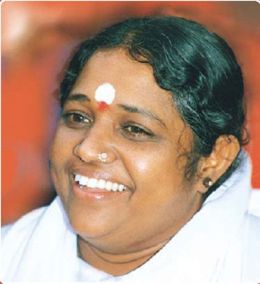
Amma-Mata-Amritanandamayi-Devi
Gospel of Sri Mata Amritanandamayi Devi
A brilliantly produced, attractive synopsis of Mata’s thoughts with colourful pictures.
Extracts from the introduction by Swami Amritaswarupananda Puri

“TRUE love transcends all barriers. It is universal. It is this love that I consider as my religion.” This teaching, put into action, is Amma’s life. Simple is her life and the love principle she has embraced. But the impact is profound. Healing and transforming the hearts of millions of people across the globe, Amma’s life stands as a testament to the truism, “Love conquers all.” Amma’s life is the ultimate success story—living proof that it is possible to transcend all barriers and obstacles, be they gender, religion, language, caste, finance or education.
Over the years, many journalists have asked Amma why does she do what she does? Why does she embrace people? Amma’s response is a counter-question, “Why does a river flow? Just as it is the nature of a river to flow, it is my nature to love. My only wish is that my hands should always be on someone’s shoulder, consoling and caressing them and wiping their tears, even while breathing my last.”
Love is Amma’s life; compassion for the suffering, the principle for which she lives. Even as a young girl, Amma spontaneously expressed love and genuine compassion to the suffering people of her village. When Amma was just nine years old, her mother fell ill. Amma was withdrawn from school in order to help with household chores and the care of her seven siblings. As she went door-to-door gathering food scraps from neighbours for her family’s goats and cows, she was confronted with the intense poverty and suffering that existed in her community, and in the world beyond it. Whenever Amma encountered people in need, she would bring them food and clothing from her won home. Amma used to even steal food and grains from her own family to feed starving people. Once, she even stole a piece of her mother’s gold jewellery and gave it to a poor family. She was undeterred by the scolding and punishment she received for doing so.
Amma was deeply affected by the profound suffering she witnessed. She accepted that suffering must be due to karma (fate), but she refused to accept this as a justification for inaction. Amma contemplated the nature of suffering in the world until she revealed a more profound truth, asking a question she continues to ask each of us today: ‘If it is one man’s karma to suffer, isn’t it our dharma (duty) to help ease his suffering and pain?’ With this simple yet profound conviction—that each of us has a responsibility to lend a helping hand to those less fortunate—Amma moved forward with confidence in her life of service and compassionate care for all beings, uniquely expressed by the motherly embrace she offers to all who seek solace in her arms.
Today, Amma is known throughout the world as a unique humanitarian and social-reformer. Whenever a situation arises and a need opens up, Amma gracefully responds and fills it.
With this simple philosophy, Amma has founded a massive and ever-growing international matrix of charitable programmes. Speaking on Amma’s accomplishment in this regard, Dr APJ Abdul Kalam, the former President of India, offered this testimony, “I want to share with you what I have learned from Amma: Giving, go on giving. It’s not only money. You can share knowledge. You can remove the pain. Everyone of us—the rich and poor—can give. There is no greater message than Amma’s giving to all the people of the world.”
Looking at the world today, most of us will agree on one thing. It is becoming exceedingly difficult to love human beings. Everywhere we look there is conflict, disharmony and pettiness. Everyone is at everyone else’s throat. It is true that science and technology have brought material advancement and comfort; however they have yet to bring us peace, harmony, love and happiness. Amma says that for these, we must turn to spirituality—the process of learning to love and establishing balance in our lives. Amma says, “We are not isolated like islands. We all are part of the universal chain, the universal network. The whole world is inextricably interconnected—economically, ecologically, psychologically and spiritually. Every action we perform, consciously or unconsciously, affects others.”
During an address delivered in New York on the occasion of the 50th anniversary of the United Nations, Amma said, “This world is like a flower. Each nation is a petal. If one petal is infested, does it not affect all the other petals? Does not the disease destroy the life and beauty of the flower? Is it not the duty of each one of us to protect and preserve the beauty and fragrance of this one world flower from being destroyed?”
According to Amma, there are two types of poverty in the world—the poverty caused by lack of food, clothing and shelter, and the poverty caused by lack of love and compassion. Amma says, “Of these two, the second type needs to be considered first because if we have love and compassion in our hearts, then we will wholeheartedly serve those who suffer from lack of food, clothing and shelter.”
While presenting Amma the 2002 Gandhi-King Award for Non-violence at the United Nations in Geneva, UN Messenger of Peace and Primatologist Dr Jane Goodall accurately described Amma as, “God’s love in a human body.” Today, the majority of people have faith in the senses alone. For them, only seeing is believing. As such Amma’s life is a tangible demonstration of the transformational power of love and compassion.
(Konark Publishers Pvt Ltd, 206, First Floor, Peacock Lane, Shahpur Jat, New Delhi-110 049; email:india@konarkpublishers.com)
Source: Organiser







